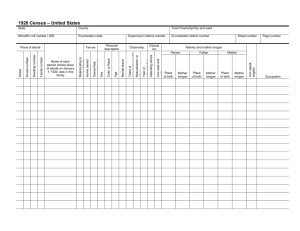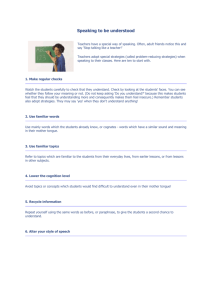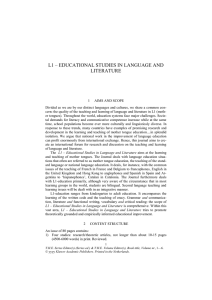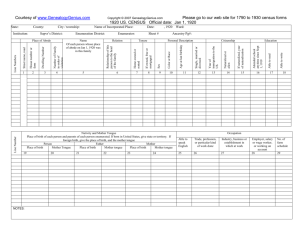The Tongue James 3:1-12
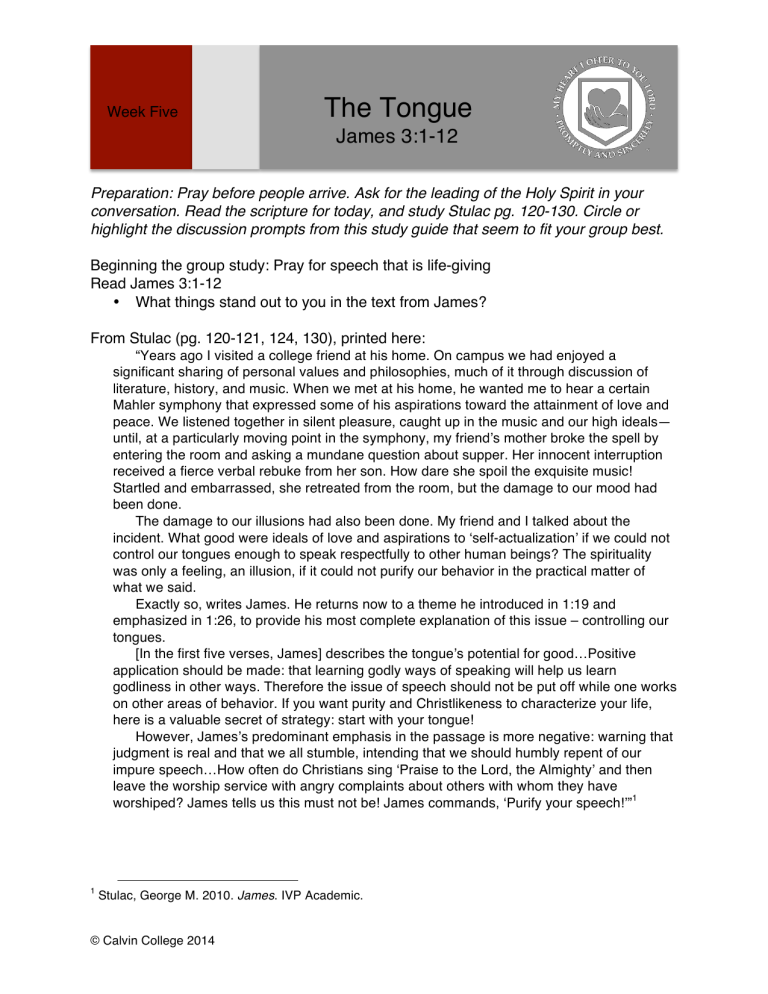
Week Five
The Tongue
James 3:1-12
Preparation: Pray before people arrive. Ask for the leading of the Holy Spirit in your conversation. Read the scripture for today, and study Stulac pg. 120-130. Circle or highlight the discussion prompts from this study guide that seem to fit your group best.
Beginning the group study: Pray for speech that is life-giving
Read James 3:1-12
• What things stand out to you in the text from James?
From Stulac (pg. 120-121, 124, 130), printed here:
“Years ago I visited a college friend at his home. On campus we had enjoyed a significant sharing of personal values and philosophies, much of it through discussion of literature, history, and music. When we met at his home, he wanted me to hear a certain
Mahler symphony that expressed some of his aspirations toward the attainment of love and peace. We listened together in silent pleasure, caught up in the music and our high ideals— until, at a particularly moving point in the symphony, my friend’s mother broke the spell by entering the room and asking a mundane question about supper. Her innocent interruption received a fierce verbal rebuke from her son. How dare she spoil the exquisite music!
Startled and embarrassed, she retreated from the room, but the damage to our mood had been done.
The damage to our illusions had also been done. My friend and I talked about the incident. What good were ideals of love and aspirations to ‘self-actualization’ if we could not control our tongues enough to speak respectfully to other human beings? The spirituality was only a feeling, an illusion, if it could not purify our behavior in the practical matter of what we said.
Exactly so, writes James. He returns now to a theme he introduced in 1:19 and emphasized in 1:26, to provide his most complete explanation of this issue – controlling our tongues.
[In the first five verses, James] describes the tongue’s potential for good…Positive application should be made: that learning godly ways of speaking will help us learn godliness in other ways. Therefore the issue of speech should not be put off while one works on other areas of behavior. If you want purity and Christlikeness to characterize your life, here is a valuable secret of strategy: start with your tongue!
However, James’s predominant emphasis in the passage is more negative: warning that judgment is real and that we all stumble, intending that we should humbly repent of our impure speech…How often do Christians sing ‘Praise to the Lord, the Almighty’ and then leave the worship service with angry complaints about others with whom they have worshiped? James tells us this must not be! James commands, ‘Purify your speech!’”
1
1
Stulac, George M. 2010. James . IVP Academic.
© Calvin College 2014
Getting started:
• How have you witnessed the impact of your own speech on others, both good and bad?
James makes an issue of the tongue because he sees the ability of the tongue to influence all of one’s life. It can be stated in a simple principle: If you can control what you say, you can control the rest of what you do.
• Talk about the ways you think that speech can corrupt every part of your life.
• This kind of power and influence that the tongue has – it has potential for good.
Discuss the ways in which you can do tremendous good with your speech.
In verses 5-12, James describes the potential dangers of speech.
• Like fire, one act of evil speech starts a destructiveness that spreads beyond the initial act. Eventually, spreading gossip leads to people not trusting you. If you are hateful with your speech, you may become hateful with other aspects of your behavior. Lament the destructiveness, either by privately writing them down, or, sharing them out loud.
• “Taming” the tongue is a journey, not a destination. James describes the tongue as ‘inherently unstable’ and restless, always prone to further evil. So what can we do? Talk about ways that you can encourage each other in speaking well – developing good ways to change the way we talk.
To the person who speaks praise to God in the worship service and then abuses people verbally at home or at work, James commands, “Purify your speech through the week!”
• Occasionally we do get angry with the people we live with, worship with, work with, or study with. Be honest with your emotions – you may have a legitimate reason to be upset; but how will you communicate that you are upset? Talk about productive ways to speak that care for others and give praise to God.
• What is the best way someone has ever given you a critique?
Jesus, in describing how a good tree produces good fruit and a bad tree produces bad fruit makes the connection to our hearts. He teaches his disciples that the mouth speaks what the heart is full of (Luke 6:45).

